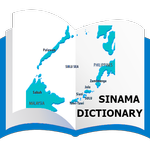
Central Sinama - English Dictionary with 13,000+ entries.
advertisement
| İsim | Sinama Dictionary |
|---|---|
| Sürüm | 1.2 |
| Güncelleme | 10 Kas 2023 |
| Boyut | 16 MB |
| Kategori | Kitaplar ve Referans |
| Yükleme sayısı | 1B+ |
| Geliştirici | Kauman Sama Online |
| Android OS | Android 4.1+ |
| Google Play ID | org.sinama.dictionary |
Sinama Dictionary · Açıklama
Work on the Central Sinama - English Dictionary has spanned the course of over half a century. The major contributing partners in this effort have been the Summer Institute of Linguistics (now SIL Philippines), the Bureau of Public Schools (now the Department of Education) and Sama individuals and communities in the Sulu province (prior to its division into the three provinces: Basilan, Sulu, & Tawi-Tawi) and in the Zamboanga province. In recent years helpful contributions have also been obtained from Sama individuals originally from these two provinces who have found themselves spread out throughout the Philippines & Malaysia with special mention of those communities in the Davao & Soccsksargen regions. Kemp Pallesen and his wife Anne have overseen this publication from start to finish.
Central Sinama is a language of the Philippines and Malaysia (known in Malaysia as Bajau). It is one of 9 separate but related Sama-Badjaw languages. Speakers of the language number in the hundreds of thousands. Dialects belonging to the language include: Sama Dilaut (in all regions of Zambasulta and diaspora communities), Sama Siasi (including those from Buliꞌ Kullul, Kūd-Kūd, Laminusa, Manubal, Musuꞌ, Punungan, Sibaud, Siganggang, Silompak, Sisangat), as well as those from Bannaran, Bintawlan, & Tabawan in Tawi-Tawi, and Kabingaꞌan in Sulu and many of the Sama residents of the Zamboanga Peninsula. The South Ubian dialect shares many features of Central Sinama as well and speakers of other Sama-Badjaw languages will certainly find many familiar words, roots, and example sentences within the contents of this dictionary.
For those looking for a Badjao dictionary, the Badjao language (Sama Dilaut) is a dialect of Central Sinama. Research for this dictionary was done among Badjao communities in Zamboanga, Sisangat, & Davao.
Central Sinama has 23 Phonemes represented by 22 letter symbols.
The 17 consonants are: b d g h ꞌ j k l m n ng p r s t w y.
The 6 vowels are: a e ꞌ i o u.
The central vowel and the glottal stop are both represented by the symbol ꞌ.
Lengthened vowels are written with a line over the top of the vowel: ā ī ē ō ū
Marking word stress is unnecessary due to the consistent penultimate stress of the Sinama language (stress falls on the second to last syllable of a word), and the orthography's marking of long vowels and attaching enclitic pronouns to verbs and nouns in example sentences.
Central Sinama is a language of the Philippines and Malaysia (known in Malaysia as Bajau). It is one of 9 separate but related Sama-Badjaw languages. Speakers of the language number in the hundreds of thousands. Dialects belonging to the language include: Sama Dilaut (in all regions of Zambasulta and diaspora communities), Sama Siasi (including those from Buliꞌ Kullul, Kūd-Kūd, Laminusa, Manubal, Musuꞌ, Punungan, Sibaud, Siganggang, Silompak, Sisangat), as well as those from Bannaran, Bintawlan, & Tabawan in Tawi-Tawi, and Kabingaꞌan in Sulu and many of the Sama residents of the Zamboanga Peninsula. The South Ubian dialect shares many features of Central Sinama as well and speakers of other Sama-Badjaw languages will certainly find many familiar words, roots, and example sentences within the contents of this dictionary.
For those looking for a Badjao dictionary, the Badjao language (Sama Dilaut) is a dialect of Central Sinama. Research for this dictionary was done among Badjao communities in Zamboanga, Sisangat, & Davao.
Central Sinama has 23 Phonemes represented by 22 letter symbols.
The 17 consonants are: b d g h ꞌ j k l m n ng p r s t w y.
The 6 vowels are: a e ꞌ i o u.
The central vowel and the glottal stop are both represented by the symbol ꞌ.
Lengthened vowels are written with a line over the top of the vowel: ā ī ē ō ū
Marking word stress is unnecessary due to the consistent penultimate stress of the Sinama language (stress falls on the second to last syllable of a word), and the orthography's marking of long vowels and attaching enclitic pronouns to verbs and nouns in example sentences.





